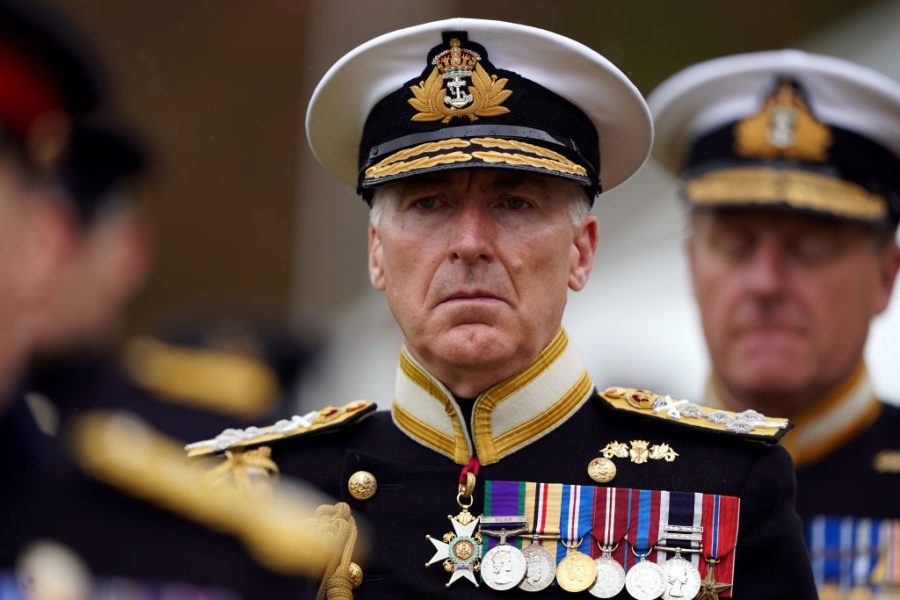Admiral Sir Tony Radakin, having handed over his responsibilities last week after four years as chief of the Defence Staff (CDS), began his new life with a speech at the Institute for Government. His 20-minute address was no bland reminiscence: the former professional head of Britain’s armed forces had a great deal to get off his chest.
He was positive about much that had happened over the past four years. The UK had led the way in supporting Ukraine, Nato had become larger and stronger and the ‘Coalition of the Willing’ had shown that European nations could act quickly and effectively. The Defence Industrial Strategy and changes within the Ministry of Defence were improving procurement and the problems with recruitment and retention in the armed forces were being addressed and gradually lessening.
There is a chronic lack of accountability in the Ministry of Defence
However, Radakin was sharply critical in one area, which was the decision-making system within the Ministry of Defence (MoD) itself:
There is a focus on process over outcome. We struggle to take long-term decisions. We lack real accountability. We fail to take risk. And we would rather waste money than risk money.
These criticisms will be familiar to anyone who has observed defence policy over the last five years; or ten, or 15, or 20 years. Here is the perfect example: the army’s new Boxer armoured fighting vehicle, which is expected to reach full operational capability in 2032 began life as a Franco-German project in 1993. The UK joined the alliance in 1996, withdrew in 2003 and rejoined in 2018. In other words, if, on an equivalent timescale, the project had begun the moment the first world war ended, the delivery would have been completed more than a decade after the end of the second world war.
Radakin drew attention in particular to the vast increase in senior civil service posts in the MoD, which have grown by 85 per cent since 2018. It is an understatement to say that neither the defence budget nor the armed forces have grown by a similar size in that time. This, he argued, had led to decision-making being slowed by too many people who could delay or cancel projects:
Reduce the power of anyone and everyone to say ‘no’ and impose the power of ‘yes’… If you are not responsible for the outcome, especially individuals in other government departments, then you should not have authority in decision making.
It is very hard to disagree with this critique. There are ice floes which look fast-moving and dynamic compared to MoD Main Building. Radakin praised the defence reform programme which has reordered the central administration of the department around four posts: the permanent secretary, the chief of the Defence Staff, the chief of Defence Nuclear and the national armaments director. However, he admitted:
There is something wrong when the government spoke of the need for a national armaments director when in opposition in February 2024 and we are unlikely to get one before February 2026.
He was too polite to mention that the permanent secretary, David Williams, has effectively been sacked, with applications for his replacement closing at the end of the month.
Heads will nod vigorously at this criticism, as mine did. But there is a nagging question: why is the man who was head of the armed forces for four years – the fourth longest-serving CDS ever – telling us this? If he could not change the way the Ministry of Defence works, then, bluntly, who can? And if three years and 276 days as our senior military figure did not give him the ability to move the needle, then how much can we expect from a speech at the Institute for Government?
Radakin’s prescription is not a complicated one. He seems to know what needs to be done, and I doubt you would find a politician who would disagree. The civil service bears its share of responsibility, but, at the end of the day, bashing bureaucrats will not do on its own. The Prime Minister is, after all, minister for the civil service, and under the Constitutional Reform and Governance Act 2010 ‘has the power to manage the civil service’, which includes the ‘power to make appointments’.
There is a chronic lack of accountability in the Ministry of Defence – among civilian and military personnel. Civil servants and soldiers, sailors and airmen move between posts every two or three years as a matter of course, meaning it is common for someone not to see a project through from start to finish. And the sanctions for poor performance are, frankly, weak. No general officer has been sacked for professional failings for well over 40 years.
None of the problems Radakin identified are intractable or insoluble. None meet an impassable legal or bureaucratic obstacle. It is for him to reflect on why he was unable to make the progress he wanted to, but in the meantime, let his speech be a challenge to the defence secretary, John Healey, to the new CDS, Air Chief Marshal Sir Richard Knighton, and the new permanent secretary when he or she is appointed.
Here is what they have to do. They have the power and authority to do it. It is widely agreed it must be done. What is stopping them?








Comments